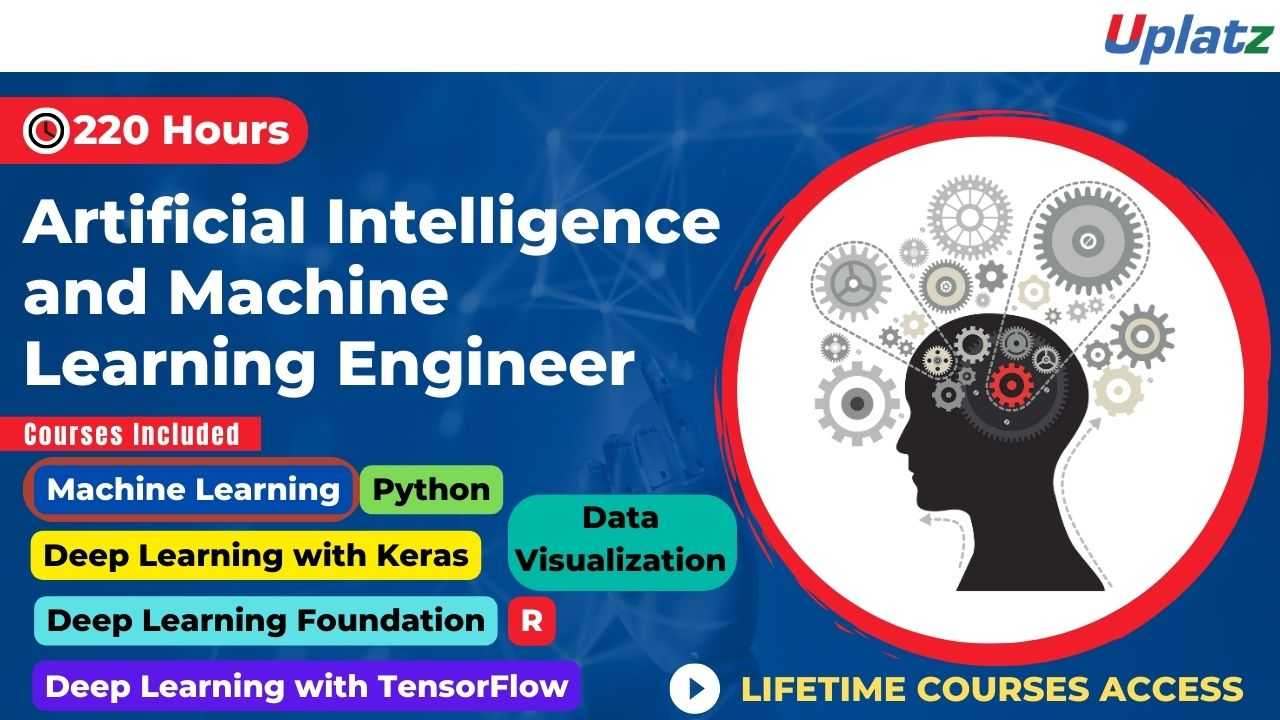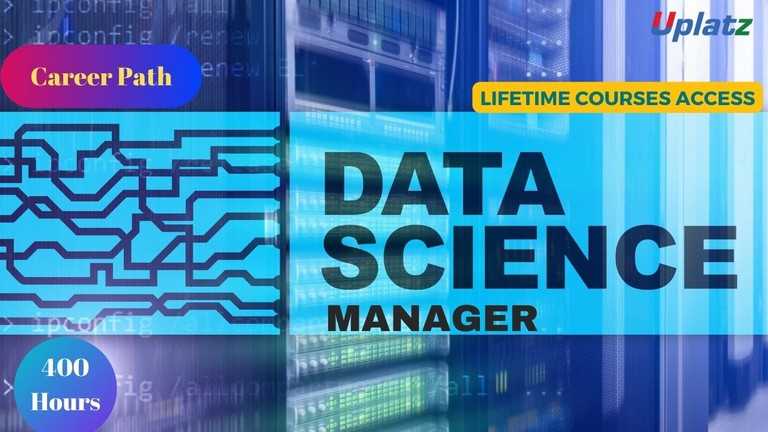Career Path - MLOps Engineer
Build a rewarding MLOps career by mastering model deployment, monitoring, automation, and ML infrastructure for real-world impact.Preview Career Path - MLOps Engineer course
Price Match Guarantee Full Lifetime Access Access on any Device Technical Support Secure Checkout Course Completion Certificate-
BUY THIS COURSE
-
 91% Got a pay increase and promotion
91% Got a pay increase and promotion
Students also bought -
-

- Career Path - AI/ML Research Scientist
- 200 Hours
- GBP 32
- 368 Learners
-

- Career Path - Artificial Intelligence & Machine Learning Engineer
- 220 Hours
- GBP 32
- 5212 Learners
-

- Career Path - Data Science Manager
- 400 Hours
- GBP 32
- 966 Learners

Career path - Machine Learning Operations (MLOps) Engineer – Self-Paced Online Course
In the era of data-driven decision-making, organizations across industries are racing to integrate machine learning (ML) into their business processes. However, developing models in isolation is not enough—what truly creates value is putting those models into production in a scalable, reliable, and governed manner. That’s where MLOps comes in, and that’s where this self-paced online course becomes your strategic advantage.
The Machine Learning Operations (MLOps) Engineer Career Path is a comprehensive, expertly designed course tailored for professionals looking to specialize in the growing field of MLOps. Whether you're a data scientist seeking to operationalize your models, a DevOps engineer expanding into ML, or an IT professional interested in next-generation infrastructure, this course gives you the tools to succeed.
This self-paced course offers flexibility without compromising on depth or rigor. It features high-quality pre-recorded video lessons, hands-on labs, real-world case studies, and practical exercises that simulate the day-to-day work of MLOps engineers. The curriculum walks you through the full lifecycle of machine learning deployment—from model training and versioning to deployment, monitoring, automation, and governance.
Why MLOps Matters
Machine Learning Operations (MLOps) is an evolving discipline that combines the best practices of machine learning, software engineering, and DevOps. The goal is simple: to automate and optimize every stage of the ML model lifecycle so that businesses can quickly and safely deploy models that generate real impact.
As organizations increasingly scale their ML initiatives, the need for professionals who understand both the data science process and the production environment has skyrocketed. MLOps engineers fill this crucial gap by ensuring that ML models are reproducible, auditable, scalable, and compliant with regulatory requirements.
This course not only helps you master the technical and procedural aspects of MLOps but also guides you in aligning machine learning operations with broader organizational goals—making you a valuable asset across sectors such as finance, healthcare, e-commerce, and tech.
What You’ll Learn
This program covers every major pillar of MLOps engineering:
- Model Training and Experimentation: Understand version control for datasets and models, explore experiment tracking frameworks, and gain hands-on experience using platforms like MLflow or Weights & Biases.
- Model Deployment and Serving: Learn how to package, deploy, and serve models using scalable and efficient infrastructures such as Docker, Kubernetes, or serverless technologies. Understand the differences between batch, real-time, and streaming deployments.
- Monitoring and Logging: Dive into monitoring strategies for model drift, latency, and data quality. Use tools that help maintain performance and reliability post-deployment.
- Automation and CI/CD Pipelines: Set up Continuous Integration/Continuous Deployment (CI/CD) pipelines tailored for ML workflows, enabling faster iteration and greater reliability.
- Governance and Compliance: Understand how to implement auditing, model explainability, and regulatory compliance into your machine learning pipelines, ensuring ethical and responsible AI use.
By the end of this course, you will have developed a robust understanding of how to create repeatable and scalable MLOps pipelines that bring business value and foster cross-functional collaboration between data science, DevOps, and IT teams.
Who This Course is For
This course is designed for a wide range of professionals, including:
- Data Scientists and ML Engineers who want to deploy and monitor models in real-world environments.
- DevOps and Site Reliability Engineers (SREs) looking to expand their skill sets into the ML ecosystem.
- Software Engineers and IT Professionals interested in supporting data-centric systems.
- Technical Project Managers or AI Product Leads seeking a deeper understanding of how ML systems are built and maintained in production.
Whether you’re transitioning into MLOps from a related role or starting fresh in the field, this course gives you the knowledge and practice to thrive in real-world settings.
How to Use This Course Effectively
This course is structured for maximum flexibility—but how you use it will determine how much you gain. Here's how to get the most out of your learning journey:
- Set Clear Learning Goals: Begin by identifying what you want to achieve. Do you want to master model deployment? Learn MLOps tools like MLflow and Kubeflow? Understand CI/CD for ML? Clear goals will help you focus and progress efficiently.
- Establish a Study Routine: Allocate time consistently. Even just an hour a day can lead to significant progress. Since the course is self-paced, creating a weekly schedule will help you maintain momentum and avoid burnout.
- Follow the Suggested Sequence: While you may be tempted to skip ahead, we recommend completing the lessons in order. MLOps processes build upon each other—from data preprocessing to model serving—so foundational understanding is key.
- Engage in Hands-On Labs: The labs are designed to simulate real industry scenarios. Treat these exercises as practice environments where you can experiment, make mistakes, and build real confidence. Don’t just watch—do.
- Take Notes and Reflect: As you learn, jot down key concepts, tools, commands, and best practices. Summarizing material in your own words helps reinforce understanding and creates a valuable revision resource.
- Explore Supplementary Tools and Documentation: MLOps is a fast-evolving space. Take time to read official documentation for tools like Docker, Kubernetes, TensorFlow Serving, or MLflow. This enhances your learning and keeps you current.
- Apply Learning to Projects: Try to integrate your learning into real or simulated projects. For instance, deploy a model using Docker and monitor it using Prometheus. The more you apply what you learn, the more confident and job-ready you'll become.
- Build a Personal MLOps Portfolio: Document your projects, code, and architecture diagrams. A solid portfolio demonstrates your ability to translate theory into practice and is invaluable for job applications or interviews.
- Revisit and Revise: If you find certain concepts challenging—like setting up CI/CD pipelines for ML or ensuring model reproducibility—go back and review them. Repetition deepens understanding and improves retention.
- Stay Engaged with the Community: MLOps is a collaborative field. Consider joining online forums, open-source projects, or social media groups focused on MLOps to stay connected and inspired.
The Machine Learning Operations (MLOps) Engineer – Self-Paced Online Course is more than just a collection of tutorials—it’s a complete career development pathway. It’s built to prepare you not just for the technical demands of MLOps roles but also for the strategic thinking and collaboration required in high-performing AI teams.
By the end of this course, you will have the skills to confidently deploy and manage machine learning systems that deliver real business impact. Whether you're working in a startup or a Fortune 500 company, you’ll be able to design and maintain ML infrastructure that is efficient, scalable, and future-proof.
Start today, learn at your own pace, and step into one of the most in-demand roles in modern tech—the MLOps Engineer.
Course/Topic - Course access through Google Drive
-
Google Drive
-
Google Drive
By the end of this course, learners will be able to:
- Understand MLOps Fundamentals – Learn the core principles of MLOps and its role in the machine learning lifecycle.
- Set Up MLOps Infrastructure – Configure cloud platforms (AWS, GCP, Azure) and containerization tools (Docker, Kubernetes) for MLOps workflows.
- Automate Model Training & Deployment – Implement CI/CD pipelines for machine learning models using tools like GitHub Actions, Jenkins, and MLflow.
- Monitor & Optimize Models – Track model performance, detect drift, and implement retraining strategies.
- Ensure Scalability & Reliability – Design fault-tolerant systems to handle large-scale ML deployments.
- Apply Governance & Compliance – Manage model versioning, metadata, and regulatory requirements.
- Integrate with DevOps Practices – Collaborate with DevOps teams to streamline ML workflows.
- Troubleshoot Common Issues – Debug deployment failures, latency problems, and data pipeline errors.
- Work with MLOps Tools – Gain hands-on experience with Kubeflow, TensorFlow Extended (TFX), and SageMaker.
- Prepare for MLOps Certification & Career Growth – Build a strong foundation for roles like MLOps Engineer, AI Infrastructure Specialist, or Cloud ML Engineer.
Syllabus
Module 1: Introduction to MLOps
- What is MLOps? Key principles and benefits
- Differences between MLOps, DevOps, and Data Science
- MLOps maturity levels (Manual, CI/CD, AutoMLOps)
- Industry use cases (Finance, Healthcare, Retail)
Lab: Setting up a basic ML project with version control (Git)
Module 2: MLOps Infrastructure & Tooling
- Cloud platforms for MLOps (AWS SageMaker, GCP Vertex AI, Azure ML)
- Containerization with Docker and orchestration with Kubernetes
- Infrastructure as Code (IaC) using Terraform
- Workflow automation with Kubeflow and MLflow
Lab: Deploying a Dockerized ML model on Kubernetes
Module 3: Data & Model Management
- Data versioning with DVC (Data Version Control)
- Feature stores (Feast, Tecton) for reusable features
- Model registries (MLflow Model Registry, SageMaker Model Registry)
- Experiment tracking (Weights & Biases, TensorBoard)
Lab: Implementing a feature store for a fraud detection model
Module 4: CI/CD for Machine Learning
- Building CI/CD pipelines for ML (GitHub Actions, Jenkins, Argo Workflows)
- Automated testing for ML models (unit, integration, bias/drift tests)
- Blue/Green and Canary deployments for ML models
- TFX (TensorFlow Extended) pipelines for end-to-end workflows
Lab: Creating a CI/CD pipeline for an NLP model
Module 5: Model Deployment & Serving
- Real-time vs. batch inference
- Model serving frameworks (FastAPI, TorchServe, TF Serving)
- Serverless deployment (AWS Lambda, GCP Cloud Functions)
- Edge deployment (TensorFlow Lite, ONNX Runtime)
Lab: Deploying a model as a REST API using FastAPI
Module 6: Monitoring & Maintenance
- Monitoring model performance (Evidently, Prometheus, Grafana)
- Detecting data drift, concept drift, and model decay
- Automated retraining strategies
- Logging and alerting for ML systems
Lab: Setting up drift detection for a recommendation system
Module 7: Scalability & Optimization
- Distributed training (Horovod, Ray)
- Model optimization (Quantization, Pruning, Knowledge Distillation)
- Cost optimization for cloud ML workloads
- High-availability architectures
Lab: Optimizing a deep learning model for edge devices
Module 8: Security, Governance & Compliance
- Model explainability (SHAP, LIME)
- Bias/fairness auditing (Fairlearn, AIF360)
- GDPR/HIPAA compliance in ML systems
- MLSecOps (Security for ML pipelines)
Lab: Implementing model explainability for a loan approval system
Module 9: Real-World MLOps Case Studies
- Netflix – Personalization at scale
- Uber – Michelangelo ML Platform
- Banking – Fraud detection in production
- Healthcare – Deploying diagnostic models
Capstone Project:
- End-to-end MLOps pipeline for a real-world problem (e.g., demand forecasting, sentiment analysis)
- Includes data prep → training → deployment → monitoring
Additional Resources
- Cheat Sheets: Kubeflow, MLflow, Terraform
- Interview Prep: 50+ MLOps interview questions
- Community Access: Private Slack/Discord for peer networking
Upon completing the MLOps Engineer Career Path course, you will receive a Course Completion Certificate from Uplatz, validating your expertise in deploying and managing machine learning models in production.
This certification serves as a valuable credential to showcase your skills in MLOps, enhancing your resume and career prospects in AI and cloud computing. The course also prepares you for advanced certifications like:
- Google Professional Machine Learning Engineer
- AWS Certified Machine Learning Specialty
- Microsoft Certified: Azure AI Engineer Associate
With this training, you’ll be well-equipped to pursue official MLOps certifications and stand out in a competitive job market.
The demand for MLOps Engineers is skyrocketing as companies increasingly adopt AI and machine learning. Completing this course opens doors to high-paying roles in tech, finance, healthcare, and more. Potential career paths include:
- MLOps Engineer – Design and maintain ML pipelines in production.
- AI Infrastructure Specialist – Optimize cloud platforms for ML workloads.
- Machine Learning Engineer – Focus on model deployment and scalability.
- Data Engineer (MLOps Focus) – Build data pipelines for ML systems.
- DevOps Engineer (ML Specialization) – Integrate ML workflows with DevOps practices.
- Cloud ML Consultant – Advise businesses on MLOps best practices.
Industries like fintech, e-commerce, and autonomous systems are actively hiring MLOps professionals to ensure their AI solutions run smoothly. With experience, you can advance to leadership roles such as MLOps Team Lead, AI Architect, or Director of Machine Learning Operations.
1. What is MLOps, and how does it differ from DevOps?
MLOps applies DevOps principles to machine learning, focusing on model deployment, monitoring, and lifecycle management.
2. Explain the key components of an MLOps pipeline.
Data versioning, model training, CI/CD, monitoring, and governance.
3. How do you handle model drift in production?
Implement monitoring tools (e.g., Evidently, Prometheus) and automate retraining pipelines.
4. What tools would you use for containerizing ML models?
Docker for containerization, Kubernetes for orchestration.
5. How do CI/CD pipelines work in MLOps?
Tools like GitHub Actions or Jenkins automate testing, building, and deploying ML models.
6. What is the role of feature stores in MLOps?
Feature stores (e.g., Feast, Tecton) centralize and manage reusable features for consistency.
7. How do you optimize ML models for low-latency inference?Use model quantization, pruning, and edge deployment (e.g., TensorFlow Lite).
8. What are the challenges of scaling ML models?
Data bottlenecks, compute costs, and maintaining consistency across environments.
9. How do you ensure compliance in ML deployments?
Track model lineage, audit trails, and adhere to regulations like GDPR.
10. Describe a real-world MLOps project you’ve worked on.
Example: "Deployed a fraud detection model on AWS SageMaker with automated retraining."









